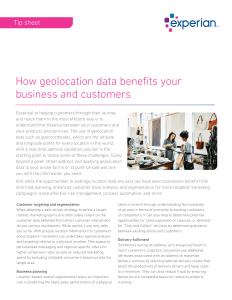- Products

Enjoy a free 30-day trial of our
data validation software.Experience the power of trusted data
solutions today, no credit card required! - Solutions

Enjoy a free 30-day trial of our
data validation software.Experience the power of trusted data
solutions today, no credit card required! - Partners

Enjoy a free 30-day trial of our
data validation software.Experience the power of trusted data
solutions today, no credit card required! - Learn more
- Pricing
- Contact Us
How geolocation data helps benefit your business and customers
Essential to helping customers through their journey and reach them in the most efficient way is to understand the distance between your customers and your products and services. The use of geolocation data such as geocoordinates, which are the latitude and longitude points for every location in the world, with a real-time address validation solution is the starting point to tackle some of these challenges. Going beyond a given street address and applying geolocation data to your online forms or at point-of-sale will arm you with the information you need.
And while the opportunities to leverage location data are vast, we have seen businesses benefit from informed planning, enhanced customer base analysis, and segmentation for more targeted marketing campaigns, more effective risk management, process automation, and more.
Customer targeting and segmentation
When adopting a data-driven strategy to define a target market, marketing teams are often solely reliant on the customer data obtained from direct customer interactions across various touchpoints. While useful, it can only take you so far. With precise location information for customers and prospects, marketers can undertake regional analysis and targeting relative to a physical location. This supports personalized messaging and regional-specific offers for higher conversion rates as well as reduced marketing spend by excluding ineligible consumers based outside the target area.
Business planning
Location-based market segmentation plays an important role in predicting the likely sales performance of a physical store or branch through understanding the suitability of an area in terms of proximity to existing customers or competitors. It can also help to determine potential opportunities for store expansion or closures, or demand for “Click and Collect” services by determining distance between existing stores and customers.
Delivery fulfilment
Sometimes having an address isn’t always sufficient to reach customers. Logistics companies use additional attributes associated with an address to maximize delivery success by planning optimal delivery routes that boost the productivity of delivery drivers and keep costs to a minimum. They can also reduce fraud by ensuring deliveries are completed based on radius to property tracking.
Risk assessments
Insurers need to undertake thorough risk assessments of properties before issuing insurance policies. Location data, specifically geocoordinates, can be used to calculate the proximity of a property to a specific location (e.g. fault lines, river banks, adverse weather spots) and assess the risk. This could mean the difference between a profitable or costly policy, so having the ability to accurately pinpoint every physical point and address in the world enables insurers to make more-informed decisions.
Service eligibility
Many businesses assign sales and services based on region and specific territories. Through mapping geocoordinates to valid postal addresses, businesses can improve precision when prospecting for new business as well as ensure complete coverage across the regions for existing customers.
How Experian can help
Powered by industry-leading address and geolocation data, Experian’s address validation software is the fastest way to capture, complete, format, validate, and enrich addresses from 245 countries in real time. With flexible address searching methods, our solution is relied upon by customers worldwide to reduce data entry time by up to 80 percent and ensure that only accurate billing, shipping, and contact addresses enter your database, along with the corresponding latitude/longitude coordinates that pinpoint your customers’ locations.
Interested in going beyond address data and equipping your team with geolocation data, too? Learn more about Experian’s address verification solutions.
